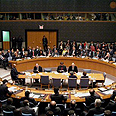
UN Security Council
צילום: AP
Time to end UN’s bias
Politicized UN body creates alienation, undermines human rights struggle
Israel will boycott the UN fact-finding commission into last January’s Gaza conflict, accusing it of “bias.” The commission, established by the UN Human Rights Council in April, is headed by Justice Richard Goldstone, former chief prosecutor of the International Criminal Tribunals for the former Yugoslavia and Rwanda. It is not the first time Israel will boycott a fact-finding commission. Israel has rejected the entrance of the inquiry commission on the Beit Hanoun's bombing headed by Desmond Tutu and refused to cooperate with it. Israel, however, is not the only one to blame for taking this attitude. The human rights council and the commission on human rights before it have taken an antagonistic approach towards Israel.
Over the Commission's 60-year history, 30% of the resolutions condemning human rights violations by specific states were directed at Israel. In 2005, the Commission adopted four resolutions against Israel and four resolutions against all other countries. Moreover, item 8 on the Commission's fixed agenda concerned Israel's violations of human rights, while item 9 was dedicated to human rights violations in the rest of the world. Nobody could cogently argue that this was a fair representation of the spread of human rights violations around the world.
This politization was one of the reasons for the Commission's reform in 2006, replacing it with the Human Rights Council, a body within the UN system made up of 47 States responsible for strengthening the promotion and protection of human rights around the globe. The Council, according to its establishment resolution 60/251, should insure "universality, objectively and non-selectivity in the consideration of human rights issues, and the elimination of double standards and politization.”
Yet the situation has not improved; it has in fact aggravated. The new election process for the Council is based on a geographical base, and the African and Asian members now have a comfortable majority (at least 26 out of 47 votes.) The decrease in the proportional representation of Western countries and the proportional increase in the representation of African and Asian countries have resulted in an escalation in the influence of the Organization of the Islamic Conference, which has used it to single out Israel.
For example, the Council's first session, on June 2006, was concluded with a resolution that placed Israel's alleged violations of human rights as a permanent item on the Council's agenda. It was the only resolution to focus on a specific country. This is particularly striking, given that at the time of the Council's first session, there was a major humanitarian crisis taking place in the Darfur region of Sudan and grave human rights concerns in Iraq and North Korea, to name but a few.
Selective application
A review of the Special Sessions held by the Council that same year reveals a similar trend at these meetings. The Council had held four Special Sessions, the first three of which were devoted to Israel. Only the fourth Special Session did not concern Israel - it focused on Sudan and was convened only after exceptionally strong statements by Secretary-General Annan as well as the High Commissioner for Human Rights.The nearly exclusive focus of these special sessions on Israel, at the cost of disregarding equally if not more flagrant human rights situations elsewhere in the world, undermines the Council’s credibility. This hostility toward Israel continued as the Council kept on to single out Israel for condemnation in 2007 and 2008. In fact, the Council concluded its September 2008 session by eliminating an investigative mandate on human rights abuses in Liberia, praising Sudan, and censuring Israel for the 20th in two years.
In January 2009, during the Gaza conflict, the Council adopted a resolution condemning Israel's human rights violation in Gaza. Although the situation was indeed urgent and grave and deserved the special attention of the Council, it's outcome was undeserving of a council expected to act in a ‘‘fair and equal manner,’’ as the one-sided resolution entirely ignored the massive human rights abuses committed by Hamas in using indiscriminate rocket attacks against Israeli civilians.
Israel's policies are not flawless. Nevertheless, and more importantly, the selective application of human rights review by the Council violates the universality nature of human rights and is discriminatory. The Council is established upon the recognition of promoting and protecting human rights based on principles of "cooperation and genuine dialogue.”Yet the selectivity and politization of the Council's agenda is not assisting to promote human rights, but the opposite.
Focusing on certain countries means that other human rights violations are not given adequate attention and that the countries at the focus are disrespecting the Council and avoiding cooperation with it. There is no wonder, therefore, that Israel is boycotting the UN fact-finding commission. Only a more balanced review by the Council will increase the cooperation with it and will encourage states to comply with their human rights obligations for the benefit of all human beings.
The writer is a lawyer and a student of Master of Laws in the London School of Economics and Political Science










